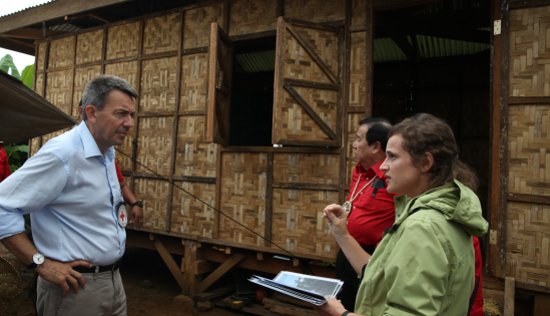|

Giporlos,
Eastern Samar. The ICRC and PRC’s rebuilding efforts,
particularly the construction of shelters, are moving at a fast
pace. As of 22 August 2014, more than 2,300 houses have been
built out of the targeted 4,500 houses in Samar island.
(©ICRC /
H.S.Toeli) |
ICRC president
stresses need to resolve plight of Zamboanga displaced
By ICRC
August 27, 2014
MANILA – Peter
Maurer, president of the International Committee of the Red Cross (ICRC),
concluded his first official visit to the Philippines today. During
his three-day stay, Mr. Maurer met with the Philippine president,
Benigno Simeon Aquino III, and other high-level officials to discuss
the humanitarian situation in the country, notably the challenges
faced by the thousands of people who remain displaced in Zamboanga
City.
Mr. Maurer also visited
Typhoon Yolanda (Haiyan) survivors on Samar Island in the Visayas
region, and assessed rebuilding efforts supported by the ICRC and the
Philippine Red Cross.
"I left Samar impressed by
the resilience of the people I met there. In the hardest-hit areas,
some survivors still need help to rebuild their homes and incomes," he
said. "During my meetings with government officials in Manila, I
reiterated the need for a durable solution for displaced people in
Zamboanga, who are still living in difficult conditions nearly a year
after the fighting came to an end in the city. I also underlined the
ICRC’s commitment to help communities in different parts of the
country to recover and rebuild amid long-standing cycles of violence
and poverty."
In the meetings, the ICRC
president also discussed an initiative launched with the national
authorities in 2007 to tackle overcrowding and improve health
conditions in prisons. With overcrowding still a serious issue in many
facilities, Mr. Maurer pledged ongoing ICRC support and urged
officials to continue their efforts.
"The relationship we have
built up with the authorities in the Philippines is very constructive
and allows for frank exchange on the issues that matter, which is
essential to our work," he said. "I am also convinced that the ICRC’s
strong operational partnership with the Philippine Red Cross will
continue to be indispensable to our efforts to respond promptly and
efficiently to disasters, whether man-made or natural."
The ICRC provides a wide
variety of humanitarian services in the Philippines, aiming for
example to improve people's access to water, their livelihoods, and
the health care available to them. In addition, ICRC delegates visit
detainees across the country, particularly those held in connection
with hostilities between the government and armed groups. The
organization has carried out humanitarian activities in the
Philippines since the Second World War and has had a permanent
presence in the country since 1982.